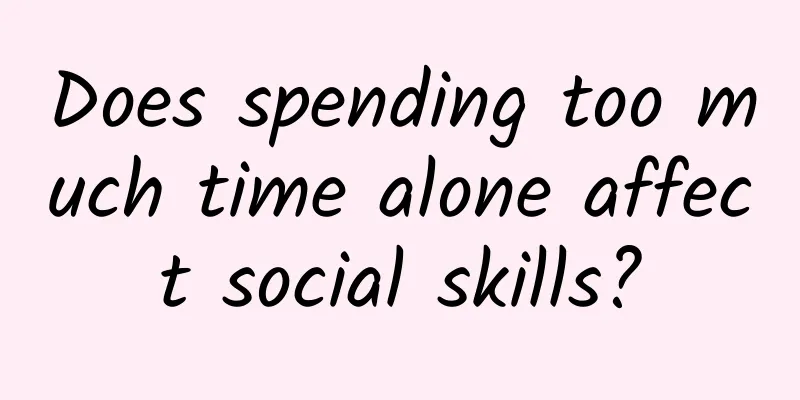Does spending too much time alone affect social skills?

|
Leviathan: Admittedly, actively choosing to be alone and passively isolating are two very different behaviors, just like a person who voluntarily retreats to the mountains and is forced to be isolated at home for a month, the two naturally lead to very different states of mind. However, as social and gregarious creatures, we should focus on the subtle changes in each individual's heart in a certain state of solitude/loneliness - this actually involves an important measurement factor: the length of time spent alone. In fact, whether we are in active solitude or passive loneliness, our brains still have social expectations, but some people have internalized this expectation into a search for self due to disappointment (with others). But once the self-reflection reaches a state where it is already what it is and is in the right place, people may break away from the "self" and look forward to another round of feedback from others. Neil Ansell is an accidental recluse. Back in the 1980s, he was living illegally in a vacant London house with 20 other people. Someone offered him a very tempting offer: a cottage in the Welsh mountains for just £100 ($130) a year. The place was sparsely populated, the sky was full of stars at night, and the only companions were a pair of ravens that had lived in a cedar tree for 20 years. The problem is that to enjoy these views you also have to endure extreme loneliness - at least for a British person. He lives on a farm in the mountains, miles away from the nearest village. The previous tenant was a single elderly man. He lived there for five years, during which time he had no mobile phones and no visitors. He said: "I was used to being alone during that time. I remember going to the village shop one day and when I asked the clerk a question, my voice was hoarse. I realised I hadn't spoken a word in two weeks and that was normal for me." © The Sunday Post When Ansell returned to civilization, he was well adjusted to living alone, and the social world was a bit of a shock to him. "I found it very difficult to talk a lot. I'm not antisocial, but it was really hard for me." Ansell also noticed that his individual identity began to dissolve. “When you’re alone, you start to lose your sense of who you are because you can’t get feedback from other people,” he said. “So I think in a way, when I reentered civilization, I had to rediscover my role in that framework.” Back in 2020, Ansell’s experience may resonate more widely than ever before. Under lockdown, quarantine and self-isolation, many people have been spending more time alone than ever before. What does long-term isolation do to the brain? Do we need social interaction? When things return to normal, will we remember how to socialize? Humans are highly social creatures, as is evident from the way we live, but an important strand of evidence lies in our brains. Dunbar's number, also known as the 150 rule, refers to the maximum number of people with whom a person can maintain close interpersonal relationships, which is generally considered to be 150. Interpersonal relationships here refer to the fact that a person knows who the other people are and understands the relationships between those people. Supporters believe that groups with more than this number of people need stricter rules, laws, and mandatory norms to maintain stability and cohesion. © Survive with Will - Thoughtful Analysis & PerceptionsIt turns out that there is a correlation between the size of primate brains and the size of the communities they can form: the larger the brain, the larger the community. Humans, with their unique organ ratios, can form larger communities than other primates, with an average of 150 individuals. This is "Dunbar's Number". The concept is widely used, such as to explain the optimal upper limit of the number of church congregants and the average number of friends on Twitter. One explanation is that socializing is a mental exercise. To successfully navigate an interaction with another person, you need to remember a great deal of information, from basic details like where they live and work to more subtle characteristics like their friends and rivals, past indiscretions, social status, and motivations. Many faux pas are caused by neglecting this basic information, like asking a friend who just got fired about his job or complaining about your children to a soon-to-be parent. Ultimately, the number of friends we can maintain is limited by our processing power. Over millions of years, species with more social connections were more likely to evolve larger brains. This suggests that socializing also has a reverse effect on the brain. In the short term, a lack of socializing can shrink the brain. Last year, German scientists found that the brain size of nine polar explorers decreased after they returned from a 14-month stint at an Antarctic research station. By comparing magnetic resonance imaging before and after, they found that the C-shaped area of the hippocampus, the dentate gyrus, which is primarily involved in the formation of new memories, had shrunk by an average of about 7%. (www.nejm.org/doi/pdf/10.1056/NEJMc1904905) In addition to reduced brain volume, the explorers performed worse on two mental tests: one that measured spatial processing, which helps them identify where objects are in space, and another that measured selective attention, or roughly the ability to focus on a specific object for a period of time. Scientists speculate that there are two reasons for this: one is that they are confined to the monotony of life in a metal box for the entire winter, and the other is the long-term lack of social interaction. In this study, they did not focus on the explorers' social skills before, during, and after this isolated life, but other studies have found that those who winter in Antarctica have a surge in social disorders during the midwinter, even though they have previously passed rigorous screening for corresponding abilities. Loneliness vs. Solitude Does social isolation affect social skills? This question is difficult to answer, but there are some clues. First, psychologists don’t really look at how many relationships you can maintain. Instead, most research focuses on how you feel about your situation. “Solitude” means being alone but not lonely, a satisfying state similar to what Ansell achieved in the Welsh mountains. “Loneliness” is a very different state, in which lonely people feel isolated and crave more social contact. Even when lonely people have the opportunity to socialize, the feeling of loneliness distorts their perception of how things will turn out, the study showed. Ironically, this means that while loneliness heightens the desire to socialize, it also impairs the ability to connect with people normally. (www.sciencedirect.com/science/article/abs/pii/S1364661309001478) For example, people who feel isolated are often more likely to feel socially oppressed, such as saying the wrong thing. They can easily fall into the trap of "confirmation bias" - actively confirming their negative views of their own status and social abilities through the words and deeds of others. This low expectation of others and improper self-perception can easily lead to unfair treatment. © Medical XpressLonely people also have to confront their own inability to regulate their thoughts, emotions and behaviours, which is closely related to the ability to comply with social norms and continuously analyse and adjust one's behaviour according to the expectations of others. The worrying thing is that this process often happens automatically - your ability to self-regulate can be affected without you even realising it. (www.sciencedirect.com/science/article/abs/pii/074959789190022L) In this way, loneliness can become a self-fulfilling prophecy, a "loneliness cycle." This can lead to a series of negative feelings: low self-esteem, hostility, tension, pessimism, and social anxiety, which ultimately alienate lonely people from others. In the worst case, loneliness can cause people to fall into depression, and a common manifestation of depression is social withdrawal, which is another vicious cycle. (www.ncbi.nlm.nih.gov/pmc/articles/PMC3874845/) Interestingly, even the solitary mice were less attractive (which is somewhat tragic), and the more sociable mice avoided them. This suggests that there is something "wrong" with these solitary mice. This phenomenon is also prominent among other species. (onlinelibrary.wiley.com/doi/abs/10.1002/dev.20025) For decades, such self-selected solitude has been more acceptable, with philosophers, religious leaders, indigenous peoples and artists extolling its benefits, but there is growing evidence that social isolation, even when it is intended, can have unintended consequences. © The ConversationTeens who prefer to be alone are more likely to lack social skills. Studies have shown that although some people may think they prefer to be alone, they actually enjoy socializing, even with strangers. This negative expectation is problematic because it prevents them from learning the true state of socializing. (www.ncbi.nlm.nih.gov/pmc/articles/PMC3766447/)(www.researchgate.net/publication/263899201_Mistakenly_Seeking_Solitude/link/55fb15a708aec948c4afa9f6/downloa) In summary, it seems that we do need social interaction, but not for the reasons you might think. Regular communication with others makes us feel valued, helps us accurately understand others' intentions, and contributes to more positive social experiences. Ty Tashiro, a psychologist and author of Awkward: The Science of Why We're Socially Awkward and Why That's Awesome, believes that we are more likely to feel awkward in modern society, but he emphasizes that for most people, the reasons for the awkwardness are likely to be very subtle. “The fact that even small deviations from social expectations can be extremely embarrassing suggests that the human brain is able to adjust itself to social expectations and then judge whether or not it lives up to those standards.” Socially awkward children For those who are still developing their skills, the more exposure, the more they learn. “Children and teenagers really need face-to-face interaction because they have to learn a lot of the social details and expectations of real life,” says Tai Tashiro. He believes this is even more important for people who are naturally easily embarrassed, including himself. “When I was in middle school and going into high school, I didn’t feel good about my social skills. One of my big perceptions at the time was that we’re just a little slow to get started with these things. I’m not a natural, but that’s not a big deal.” To make up for this weakness, Tashiro deliberately cultivated social awareness and practiced it. Mice that are raised alone have smaller brains and significantly altered behavior, and are often used as an animal model for schizophrenia, where social impairment is a key symptom. Ants that have been isolated since childhood also have smaller brains and behave differently from their peers, and social fish that are raised alone also become less sociable. (www.sciencedirect.com/science/article/abs/pii/S0006899310011856)(link.springer.com/article/10.1007/s00114-016-1364-1)By observing the behavior of chimpanzees that had "retired" from the laboratory (all of them had experienced social isolation to varying degrees), scientists found that chimpanzees that had been isolated at a younger age had lower tolerance for invasion of their personal territory, were less likely to groom the hair of other members (an important way to enhance communication), were less socially active, and had smaller social groups. (psycnet.apa.org/record/2011-00627-005) © The New York Times As for human children, studies have found a direct correlation between the amount of social interaction and social skills. In a group of Portuguese preschoolers, those who were more socially engaged also showed corresponding improvements in social skills, and participation in extracurricular activities (even sports) has repeatedly been shown to help. Meanwhile, children with more siblings tend to be better at navigating the social world; like adults, children who spend more time alone tend to interpret social situations in self-defeating ways. What better place for kids to practice social interaction than at school? Even before the pandemic, large numbers of children around the world were out of school; as of 2012, there were 1.8 million homeschooled children in the United States. But now some experts predict that we are on the cusp of a revolution in which remote learning will increasingly replace face-to-face interactions between children and teachers. Concerns about the potential harms of homeschooling, which has been banned in Germany since 1919, have been raised for years, because schools provide a platform for training in social skills. However, this view is controversial because although there is some evidence that homeschooled children are less socially competent, they are more socially engaged as adults. While the drawbacks of social isolation have been proven, the good news is that it is not entirely without benefits. Beneficial solitude On the one hand, Shirota thinks it's necessary to endure some social awkwardness. Interestingly, partners of shy or socially anxious people told Shirota that they were good partners because they carefully considered why someone might feel a certain way or the best way to respond in different situations. "That kind of thoughtfulness is really cute," Shirota said. On the other hand, Ansell wants to emphasize that his experiences with solitude have been positive, and that the right attitude to solitude is essential: "I think the reason people are generally miserable is that they haven't been alone enough," he said. He saw the opportunity to live alone in the Welsh mountains as a challenge to see how self-sufficient he could be. But the challenges Ansell faced were not just living alone. Without running water, electricity, transportation or mobile phones, most of the food was grown or foraged by himself. He said: "But soon I didn't feel it was a challenge anymore. It felt like I was living my own life. This started to become a normal life state." The thing is, Ansell has no idea how long this isolation will last. "I think people are always looking at the end when they're isolated and alone, wondering when they're going to get back to 'normal.' But nothing I do is planned, and there's no end in sight. I'm just soaking it up as much as I can." Today, after writing three books (the latest, The Circling Sky: On Nature and Belonging in an Ancient Forest, due out in 2021), Ansell says his five years of solitude are still paying off. In the end, he knows that if it all went to hell, he’d end up alone in a shack in the middle of nowhere—or, well, it could be worse. By Zaria Gorvett Translated by Yord Proofreading/Amanda Original article/www.bbc.com/future/article/20201022-how-solitude-and-isolation-can-change-how-you-think This article is based on the Creative Commons Agreement (BY-NC) and is published by Yord on Leviathan The article only reflects the author's views and does not necessarily represent the position of Leviathan |
<<: How to eat to control blood sugar? The secrets are all here, a must-read for diabetics!
Recommend
Why do diabetics feel dry mouth? How to relieve dry mouth in diabetics
Diabetes is caused by high blood sugar and has a ...
What are the effects of anemia on pregnant women?
A woman's body will undergo great changes aft...
How are uterine cysts formed and what are the causes?
Uterine cyst is a common gynecological disease in...
What are the causes of vaginal bleeding?
Normal menstruation is of great significance to w...
What are the folk customs of Hulunbuir Prairie in Inner Mongolia? Where is the Populus euphratica forest in Inner Mongolia?
The Mongolians have been a hospitable nation sinc...
How big does the follicle develop before ovulation?
There are many things that women need to pay atte...
How to use catheter tampons
Catheter tampons are generally used by many women...
Can a swordfish kill a shark? What can't people eat from a shark's belly?
Sharks live in the ocean and are the most ferocio...
Why does outdoor exercise help slow the progression of myopia?
Now we often hear that taking children to outdoor...
Is endometrial scraping painful?
For women, if polyps or tumors appear inside the ...
What should you pay attention to the day before the abortion?
There are many things that women need to pay atte...
What are the benefits of Moringa seeds? Common ways to eat Moringa seeds
Moringa seeds contain a lot of nutrients, includi...
How to get rid of illness on the last day of confinement
Many people say that if women recover well during...
The echo of the gestational sac can be seen in the uterine cavity
The phenomenon of visible echo of gestational sac...
How to treat thick endometrium
Endometrial thickening is an abnormal manifestati...









